Featured
Koenigsegg Sets New Record: 0-250-0 MPH in 28.27 Seconds

Koenigsegg just officially broke its own 0-400-0 km/h world record in Sweden last week, with a Jesko Absolut shaving nearly a second off the Koenigsegg Regera’s previous record. 400 km/h equates to about 248.5 mph, which the Jesko Absolut reached from a dig in a mind-boggling 18.82 seconds, and then completed the trip…

New cars gain 400kg weight in seven years | Giga Gears
 Rapid rise in mass is driven by electrification, popularity of SUVs and disappearance of lightweight small cars
Rapid rise in mass is driven by electrification, popularity of SUVs and disappearance of lightweight small cars
The average weight of a new car has increased by nearly 400kg over the past seven years, according to Autocar data.
Analysis of weight figures from Autocar road tests shows that between 2016 and 2023 – approximately one model cycle – the mean average kerb weight of new cars rose from 1553kg to 1947kg.
The increase is in part attributable to the increasing popularity of SUVs. Of all the cars road tested by Autocar in 2016, 16 were SUVs or crossovers. These had a mean average weight of 1722kg, 169kg above that for all models tested that year.
Many of the SUVs driven that year were heavier than their saloon or hatchback counterparts. The Skoda Kodiaq, for example, weighed 1751kg, 246kg heavier than the Skoda Superb tested the year prior. Similarly, the Jaguar F-Pace was 180kg heavier than the XF with the same 2.0-litre diesel engine.
In 2023, a total of 24 SUVs, crossovers and pick-up trucks were tested, tipping the scales at a mean weight of 1985kg. That is a gulf of 38kg compared with the overall average – significantly smaller than the 169kg difference in 2016.
SUVs and crossovers averaged 1906kg, which was below the mean average for all models tested in 2023 – suggesting that although the increased proportion of SUVs on the market is partially responsible for the overall rise in weight, it isn't the sole cause.
This suggestion is backed up by the fact that the average SUV tested in 2023 was 183kg heavier than it was in 2016.
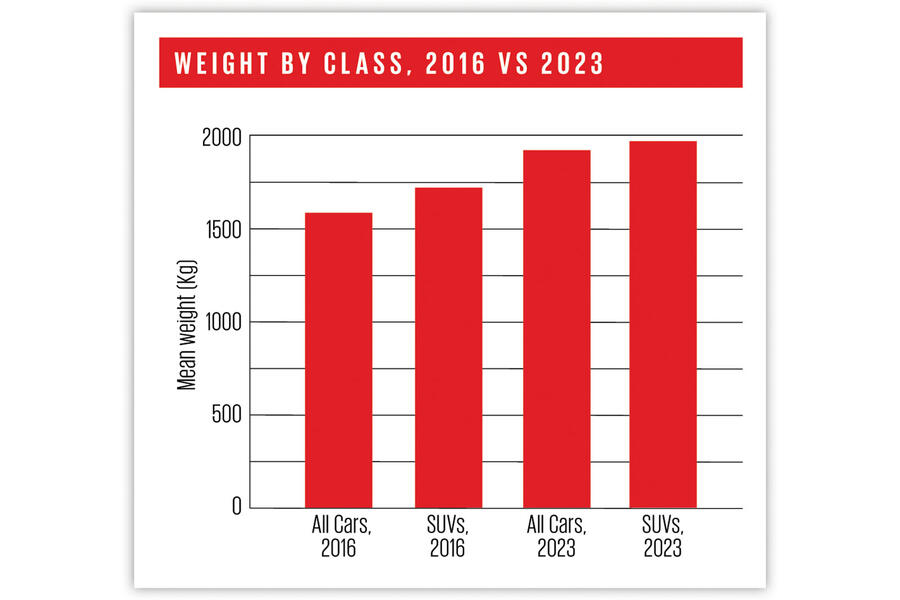
Electrification has too played a role in fattening new cars. Battery-electric models road tested by Autocar last year had an average weight of 1991kg. Combustion-engined cars were almost 100kg lighter, at 1897kg.
Excluding hybrids and plug-in hybrids, which carry the burden of electric motors and sizeable batteries, this figure falls to 1841kg, or 150kg less than the average EV.
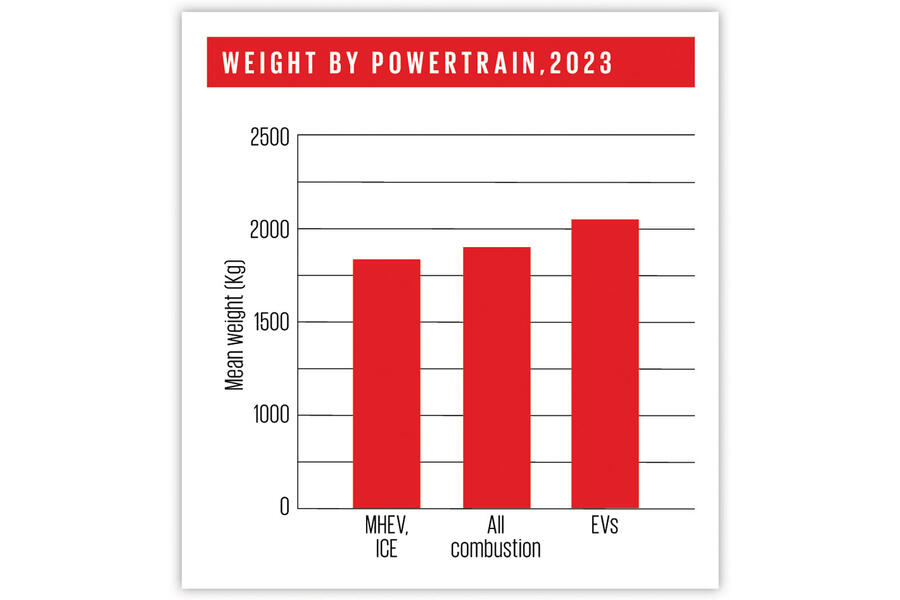
This difference is reflected in the broader trend for cars road tested by Autocar since 2000. The annual average oscillated between 1500kg and 1650kg until 2018, when it hit the 1700kg mark for the first time. It dipped back down to 1675kg in 2019 but has only increased since, hitting 1879kg in 2022 and then 1947kg the year after.
The trend shows no signs of reversal, either: the average weight of cars tested during the first quarter of 2024 – a majority of which were either electric, an SUV or both – was 2087kg.
The heftiest of these was the electric Mercedes-Benz EQS SUV, at a once-unthinkable 2899kg.
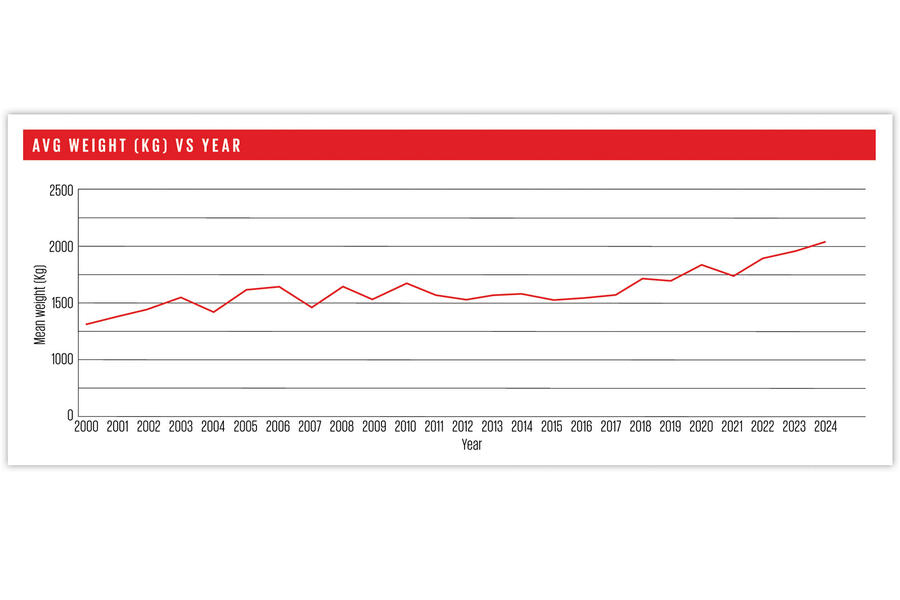
Of course, electrification and the popularity of SUVs aren't solely to blame for the ongoing rise in weights. The erosion of the city car and supermini classes also plays a role in helping to push up average weights, with fewer sub-1000kg models arriving each year to offset the heaviest cars in the market.
In 2003, Autocar road tested six cars that weighed less than 1000kg and a further six that were between 1000kg and 1100kg. In 2023, only one ‘car’ under 1000kg was tested – the Citroën Ami – which is not technically a car but a quadricycle.
The lightest proper car tested last year was the Alpine A110 R sports coupé, at 1065kg, followed by the Hyundai Kona petrol crossover, at 1352kg.
“2025 Audi Q6 E-Tron: Updated Recipe for Right-Size Sausage | Giga Gears”
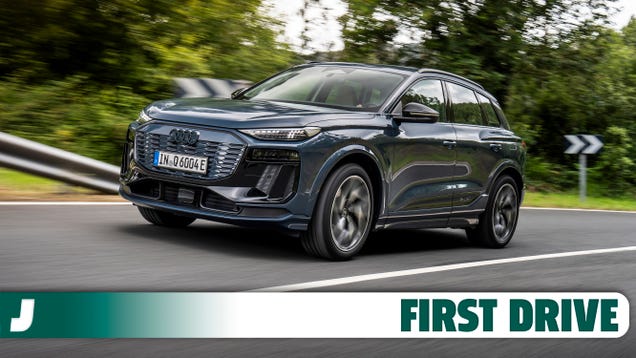
Is the Audi Q4 E-Tron too small for your needs, while the Q8 E-Tron is too big? Well, look no further than the 2025 Q6 E-Tron, the latest electric Audi crossover designed to split the difference between its larger and smaller siblings. That’s not exactly the most exciting introduction, but it’s true, and it’s also…

Volvo EX30 owners receive refunds for software problems
 Issues range from screens going black and steering-wheel buttons not responding to cars not charging
Issues range from screens going black and steering-wheel buttons not responding to cars not charging
Volvo is working to fix a number of serious software issues with the EX30 that has, Autocar has been told, resulted in some owners handing their cars back.
These issues, owners say, range from screens going black and steering-wheel buttons not responding to cars not charging and even emergency braking systems randomly activating.
Owners have also shared stories and images online of bricked infotainment touchscreens, incorrect information displayed (such as time and range), profiles reverting back to factory settings and driver aids failing.
Some issues have been so crippling that owners have returned their cars to Volvo for full refunds, Autocar has been told.
In response, a Volvo spokesperson said in a statement: “We recognise that this is not what they expect from their Volvo car, and we are working to remedy this as swiftly as possible with the minimum of inconvenience to our customers.”
The EX30 relies heavily on its software, with most key functions, including the headlights, wing mirrors and climate control, accessed through its central touchscreen.
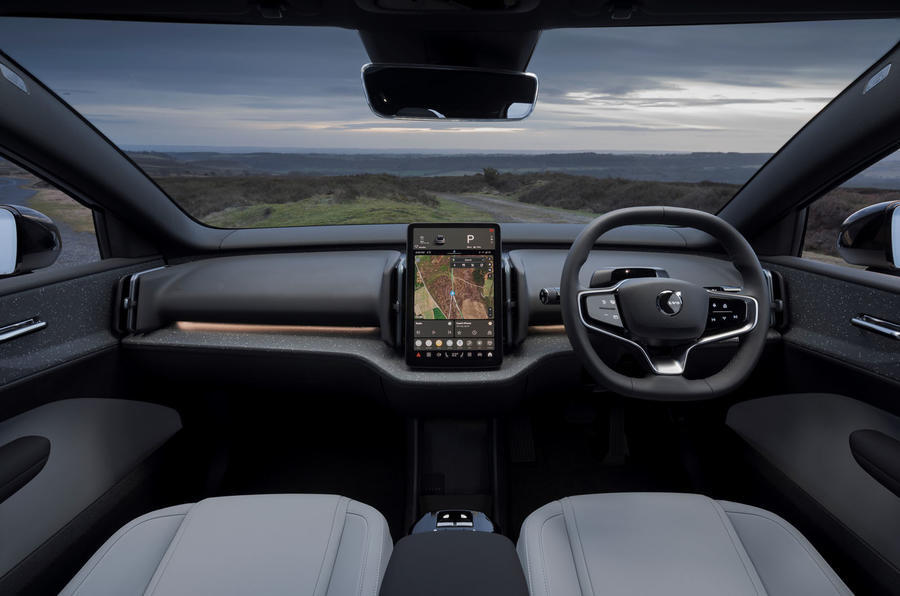
The electric crossover’s physical controls are limited to window switches, door locks and hazard warning buttons, with steering column switches controlling drive selection, indicators and wiper control.
Volvo has told Autocar that the EX30 has been taken off of its UK online configurator because a 2025-model-year version is due on 8 July. The firm insists the machine remains on sale, with examples currently in dealer stock available,and customers able to go to a dealer and pre-select an MY2025 version while the configurator is updated.
Volvo confirmed that any changes being made for MY2025 “will be minimal”, given that software changes can be applied over the air.
This isn’t the first time Volvo, owned by Chinese colossus Geely, has experienced issues with the EX30’s software. Before it hit forecourts in February, Volvo held back examples while key “debugging” software updates were performed.
The company previously told Autocar that no major changes would be made until it had received data and feedback from customers.
Volvo Offers Full Refunds for New EV with Software Issues
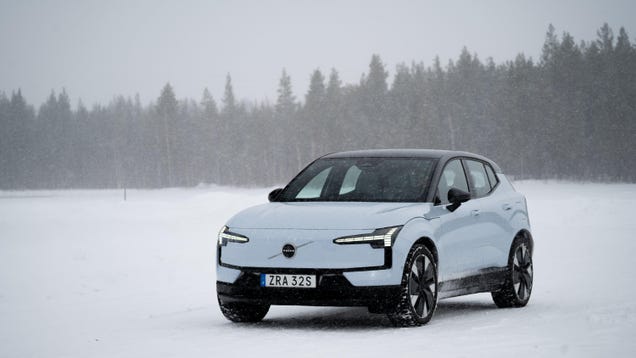
The Volvo EX30 is a very fun, very reasonably priced little electric crossover. It’s also delayed in the U.S. thanks to new tariffs on Chinese-built cars, and it seems the problems get worse from there: Volvo has halted sales on the model abroad after a wave of software issue reports from customers.
